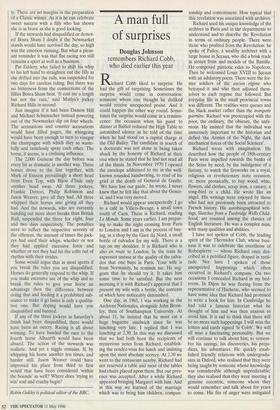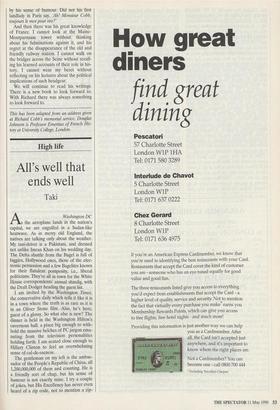A man full of surprises
Douglas Johnson remembers Richard Cobb, who died earlier this year
Richard Cobb liked to surprise. He had the gift of surprising. Sometimes the surprise would come in conversation: someone whom one thought he disliked would receive unexpected praise. And it could happen the other way round. Some- times the surprise would come in a reminis- cence: the occasion when his guest to dinner at Balliol reduced the High Table to astonished silence as he told of the time when he had stood on a capital charge at the Old Bailey. The candidate in search of a doctorate was not alone in being taken aback by the honesty of Richard at their viva when he stated that he had not read all of the thesis. In November 1970 I opened the envelope addressed to me in the well- known rounded handwriting, to read of his grief at the death of General de Gaulle. `We have lost our guide,' he wrote. I never knew that he felt like that about the Gener- al, and I was very moved.
Richard would appear unexpectedly. I go to a café in Villers-Bocage, a small town south of Caen. There is Richard, reading Le Monde. Some years earlier, I am prepar- ing to make the night crossing from Paris to London and I am in the process of buy- ing, in a shop by the Gare du Nord, a small bottle of calvados for my wife. There is a tap on my shoulder. It is Richard who is also en route to London. In the train he expresses unease at the quality of the calva- dos that one buys in Paris. Your wife is from Normandy, he reminds me. He sug- gests that he should try it. It takes him some time to be satisfied. But the next morning it is with Richard's approval that I present my wife with a bottle, the contents of which have noticeably diminished.
One day, in 1963, I was working in the Archives Nationales, alongside John Brom- ley, then of Southampton University. At about 11, he insisted that he must eat a huge baguette sandwich since he was lunching very late. I replied that I was lunching at 2.30. In this way we discussed that we had both been the recipients of mysterious notes from Richard, establish- ing the rendez-vous for lunch and insisting upon the most absolute secrecy. At 2.30 we went to the restaurant nearby. Richard had not reserved a table and most of the tables had chairs placed upon them. But our pres- ence was accepted. After a while Richard appeared bringing Margaret with him. And in this way we learned of the marriage which was to bring him children, compan- ionship and contentment. How typical that this revelation was associated with archives.
Richard used his unique knowledge of the archives in Paris and in the departments to understand and to describe the Revolution in terms of ordinary people. There were those who profited from the Revolution: he spoke of Palloy, a wealthy architect with a large house in Sceaux, who did a brisk trade in stones from and models of the Bastille. He composed patriotic odes to Napoleon. Then he welcomed Louis XVIII to Sceaux with an adulatory poem. There were the for- mer soldiers of the ancien regime who betrayed it and who then adjusted them- selves to each regime that followed. But everyday life in the small provincial towns was different. The realities were queues and the black market rather than the trompette gueniere. Richard was preoccupied with the poor, the ordinary, the obscure, the unfa- mous. He insisted that the individual was immensely important to the historian and defied 'the Armies of the Night, the dark mechanical forces of the Social Sciences'.
Richard wrote with imagination. He described how the people of 18th-century Paris were impelled towards the banks of the Seine by need, by the indulgence of a fantasy, to watch the fireworks on a royal, religious or revolutionary state occasion, or, more prosaically, to buy wood, wine, flowers, old clothes, scrap iron, a canary, a song-bird or a child. He wrote like an angel. His writings were enjoyed by those who had not previously been attracted to French history. His autobiographical writ- ings, Sketches from a Tunbridge Wells Child- hood, are counted among the classics of English literature. He was a complex man, with many qualities and abilities.
I have not spoken of Cobb, the leading spirit of the Thermidor Club, whose busi- ness it was to celebrate the overthrow of Robespierre — whom Richard once des- cribed as a petrified figure, draped in recti- tude. Nor have I spoken of those unexpected happenings which often occurred in Richard's company. On two occasions I concealed Richard in my bed- room. In Dijon he was fleeing from the representative of Hachette, who seemed to have some idea that Richard had promised to write a book for him. In Cambridge he had told a famous historian what he thought of him and was then anxious to avoid him. It is sad to think that there will be no more such happenings. I will miss the letters and cards signed 'le Cobb'. We will all miss a fascinating personality. But we will continue to talk about him, to remem- ber his sayings, his discoveries, his preju- dices, his adventures. He quickly estab- lished friendly relations with undergradu- ates in Oxford, who realised that they were being taught by someone whose knowledge was considerable although unpredictable; they also realised that they were meeting a genuine eccentric, someone whom they would remember and talk about for years to come. His fits of anger were mitigated by his sense of humour. Did not his first landlady in Paris say, Ah! Monsieur Cobb, toujours le mot pour rire?'
And then there was his great knowledge of France. I cannot look at the Maine- Montparnasse tower without thinking about his fulminations against it, and his regret at the disappearance of the old and friendly railway station. I cannot walk on the bridges across the Seine without recall- ing his learned accounts of their role in his- tory. I cannot wear my beret without reflecting on his lectures about the political implications of such headgear.
We will continue to read his writings. There is a new book to look forward to. With Richard there was always something to look forward to.
This has been adapted from an address given at Richard Cobb's memorial service. Douglas Johnson is Professor Emeritus of French His- tory at University College, London.



































































 Previous page
Previous page